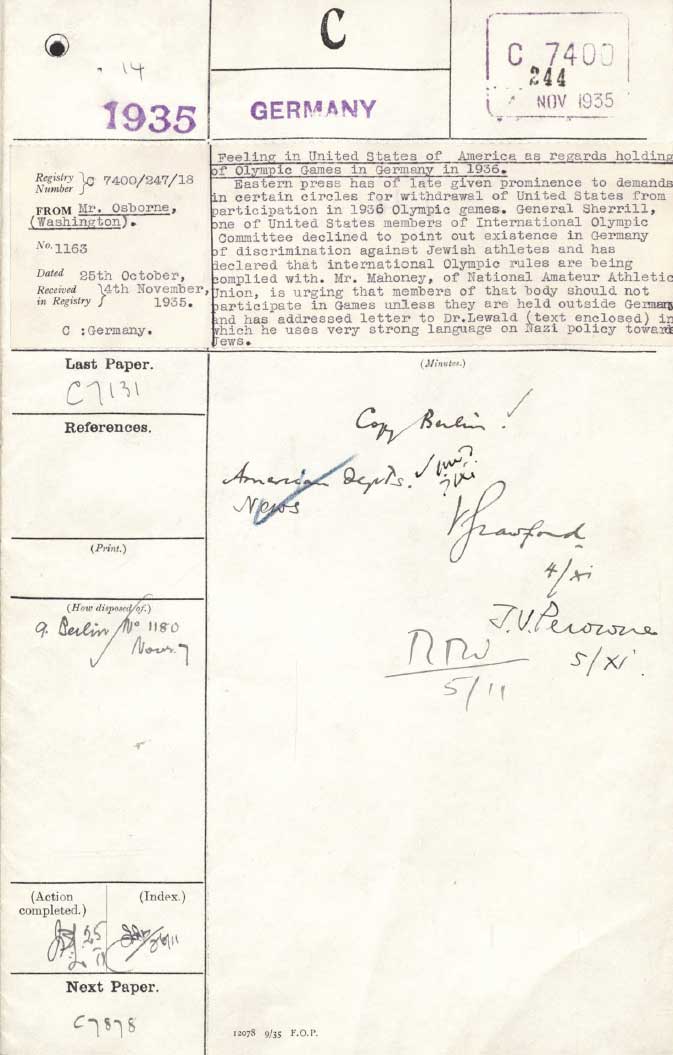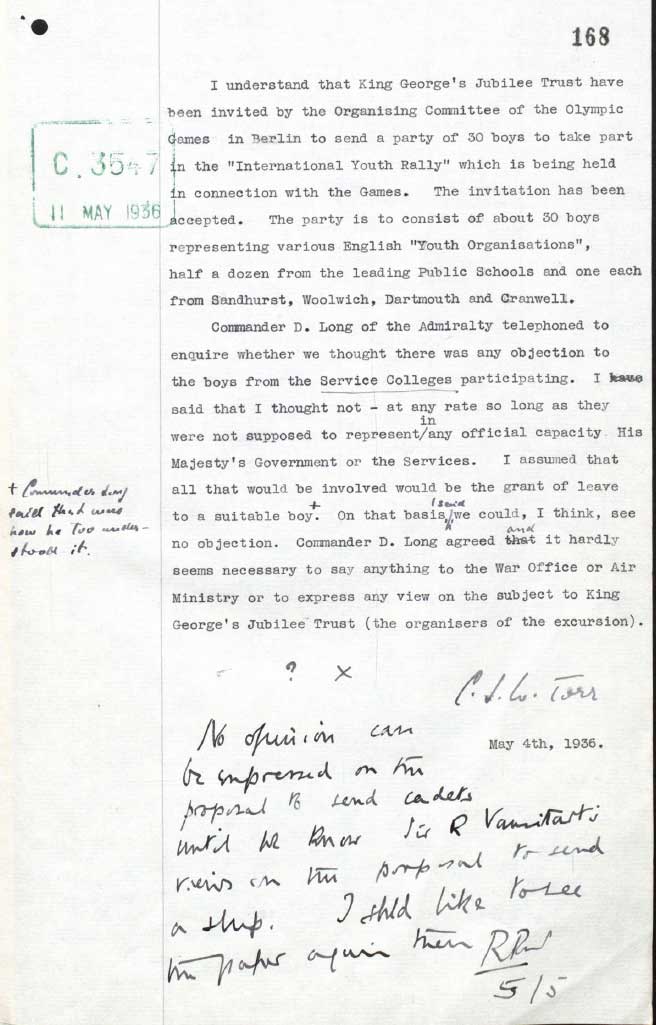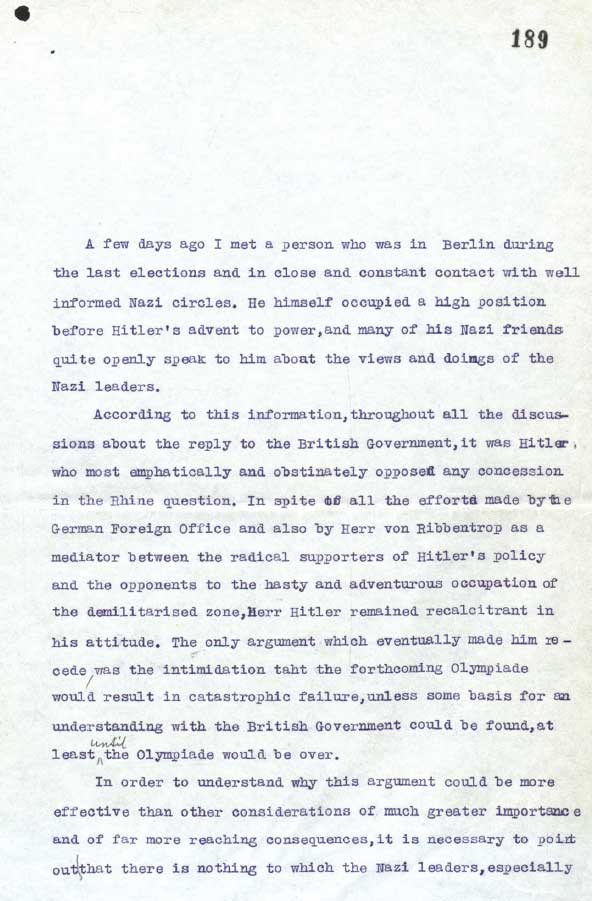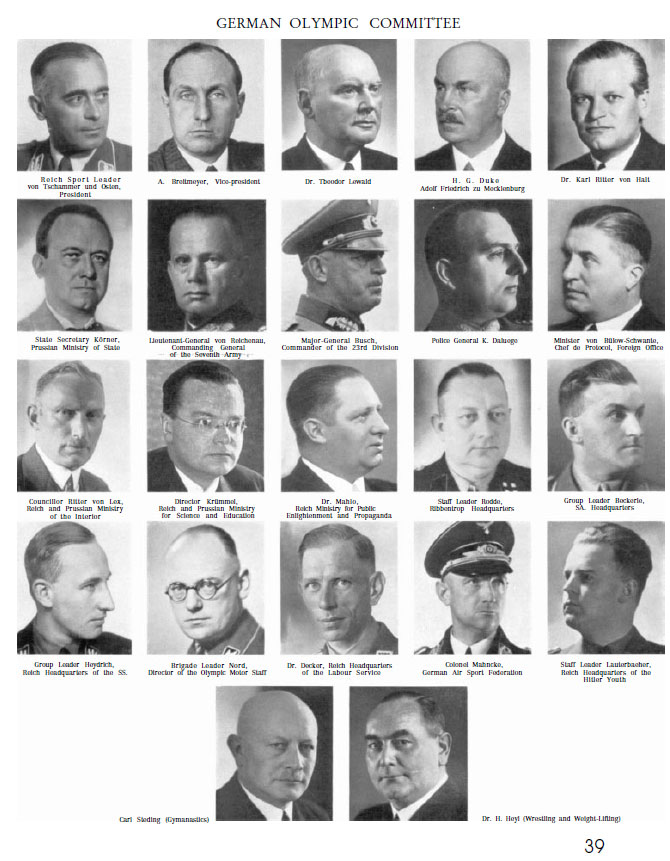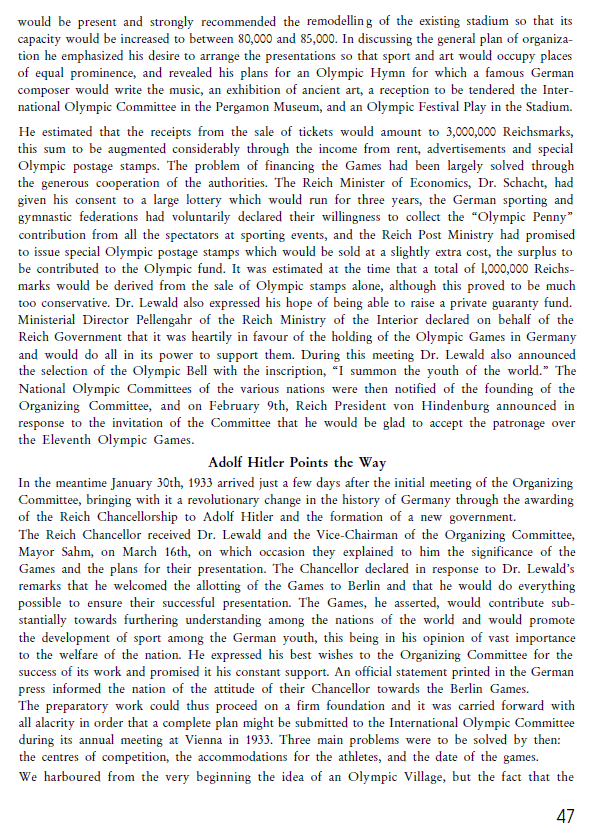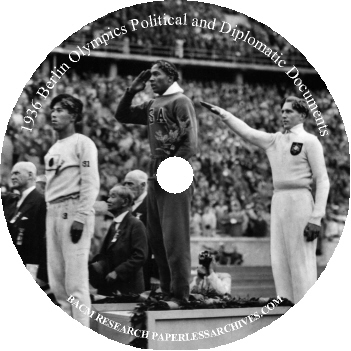|
On September 26, 1931 the International Olympic Committee awarded the Games of the XI Olympiad, 1936 Olympics, to the city of Berlin, Germany, rejecting the bid of Barcelona, Spain. The IOC made its choice in part to show that Germany had returned to the world community, 13 years after its defeat in World War I. The decision was made approximately two years before Germany came under Nazi control.
After Nazi Party leader Adolf Hitler became chancellor, Germany was turned into a one party dictatorship. The Nuremberg Laws were passed in September 1935, anti-Semitism and racist nationalism ruled.
Hitler at first disliked the internationalism of the Olympics. Joseph Goebbels, Minister of Propaganda in Nazi Germany, convinced Hitler that the Olympics could serve their purposes. The Nazi regime realized that the Olympic Games presented a unique opportunity to present to foreign spectators and journalists a positive image of Nazi lead Germany. Goebbels carefully orchestrated the appearance of a peaceful and tolerant Germany.
As part of the preparations for the Games, anti-Semitic signs and slogans were removed. The German Ministry of the Interior authorized the chief of police to arrest all Romani (Gypsies) and keep them in a special camp.
In the years leading up to start of the 1936 Games, a number of foreign governments and community leaders became increasingly critical of Nazi racial ideology, and the German government-sponsored Nazification of athletics in Germany. Opposition to holding the Games in Nazi Germany gained support in many countries, particularly in Britain and the United States, where opponents of the Nazis called for a boycott.
The Nazi government promoted the falsehood that all athletes were treated fairly in Germany. Germany made a number of minor compromises and ultimately those calling for boycott changed their minds or were overruled.
The Games went on and were an unprecedented public relations success. The New York Times said that the Games put Germans "back in the fold of nations," and even made them "more human again."
The 1940 Olympics were scheduled to take place in Japan and were cancelled due to the spread of war.
The Olympics resumed after end of World War II in 1948, with the 1948 Winter Olympics held in St. Moritz, Switzerland and the 1948 Summer Olympics held in London.
DOCUMENTS ON THE DISC
BRITISH FOREIGN OFFICE FILES
142 pages of British Foreign Office files dealing with political and diplomatic issues surrounding the hosting of the 1936 Olympic Games by Germany, dating from May 1935 to August 1936. Highlights among the documents include:
A May 1935 report includes a copy of a letter from the Archbishop of York sent to the British Olympic Association asking that body to send a letter to Herr Hitler (draft enclosed) appealing to him to inaugurate the forthcoming Olympic Games by declaring amnesty for all those imprisoned for religious or racial reasons.
A November 1935 memo concerning the feeling in the United States regarding the holding of the 1936 Olympic Games in Germany.
A November 1935 telegram from British Ambassador to Germany Eric Phipps, to Permanent Under-Secretary at the Foreign Office Robert Vansittart, highlights the problems Hitler was having with carrying out the persecution of Jews through the Nuremberg Resolutions, while there was threat of a possible boycott of the 1936 Olympics. The Foreign Office's response shows the British government's inability to form a policy concerning what stance the British Olympic Association should take.
A November 1935 memo concerning German Chancellor Adolf Hitler's interest in the games, German fears that the United States would withdraw, and the inclusion of a Jewish woman on the German fencing team. British Ambassador to Germany Eric Phipps writes that Hitler is taking great interest in the Games and is beginning to regard political questions very much from the angle of their effect on the Games. Phipps wrote, "This is particularly true in matter of Jewish question, German Government being terrified lest Jewish pressure should induce United States Government to withdraw their team. German keenness not to offend Americans is shown by official decision to include Jewess, Fräulein Meyer, in German Olympic fencing team."
This is in reference to Helene Meyer. Meyer at the age of 17 won two gold medals for Germany at the 1928 Olympics. Because her father was Jewish, she was expelled from the Offenbach Fencing Club in 1933 as part of the Third Reich's purge of Jewish athletes. Meyer soon left Germany and moved to the United States. In the United States the Amateur Athletic Union (AAU) decided that it would boycott the 1936 Berlin Olympics if Jews were forbidden from representing Germany. In an effort to thwart efforts to boycott the Olympics, the German Olympic Committee invited Meyer to join the German national team.
Despite objections from prominent members of the American Jewish community and other Jewish athletes, she returned to Germany to participate in the Games. She was the only Jewish athlete who represented Germany at the Berlin Games, winning a silver medal. During the medal ceremony Meyer wore a swastika and extended her right arm in the Nazi salute while standing on the winners' platform.
A February 1936 memo from the British Ambassador to Germany Eric Phipps, covering the agitation in United States against American participation at the Berlin Games that was causing considerable anxiety in Germany, and the relief felt by German officials when the team actually arrived. The memo says there was dissatisfaction in the American camp and an official of the British Ministry for Foreign Affairs was sent to pacify them.
June 1936 minutes of conversation and meeting between Rowland Kenney of the Foreign Office Press Department with scholar and Hebrew literature professor Dr. Yahuda, who suggested a boycott of the Olympic Games. The files include a report written by Dr. Yahuda on how Nazi Germany was exploiting the Olympics for propaganda purposes.
A July 1936 memo covers measures taken by German authorities to impress foreign visitors to the Olympic Games. Includes the text of a confidential circular issued by Herr Darre, German Minister of Food and Agriculture, instructing the rural population on how to behave during the period of the Olympic Games with a view to giving foreigners a good impression of Nazi Germany.
A July 1936 file contains a translation of an anonymous letter circulated to missions in Berlin complaining about the exclusion of Fraulein Bergmann from the Olympic Games, presumably owing to fact that she was Jewish.
German born Gretel Bergmann was a champion high jumper. In 1933 she was barred from German athletic clubs because she was Jewish. Following this she moved to Britain. As part of an attempt to prevent nations from boycotting the games, the German government requested that she return to Germany to train and compete in the Olympics. She came back because her family members that were still in Germany could face reprisal. After the United States was fully committed to participating in the games, she was removed from the team after tying the German women's high jump record.
GERMANY'S REPORT ON THE SUMMER 1936 GAMES (ENGLISH LANGUAGE VERSION)
A reproduction of the 1,234 page report, "The XIth Olympic Games Berlin, 1936 Official Report by the Organisationskomitee für dies XI. Olympiade Berlin 1936 e. v."
GERMANY'S REPORT ON THE WINTER 1936 GAMES (GERMAN LANGUAGE VERSION)
A 463 page report, Herausgegeben vom Organisationskomitee für die IV. Olympischen Winterspiele 1936. Garmisch-Partenkirchen E. V. The 1936 Winter Games were held in Garmisch-Partenkirchen in Bavaria, Germany.
BONUS MATERIAL
THE JAPANESE 1940 OLYMPIC REPORT (ENGLISH LANGUAGE VERSION)
A 205 page report, "Report of the Organizing Committee on its Work for the XIIth Olympic Games of 1940 in Tokyo Until the Relinquishment," by the Organizing Committee Of The XIIth Olympiad Tokyo, 1940.
The 1940 Olympic Games were scheduled to take place in Japan. The Winter Games were to take place in Sapporo, and the summer games in Tokyo. The games were cancelled in 1938. The report details Japan's preparations for the 1940 games, up until it cancellation.
|
